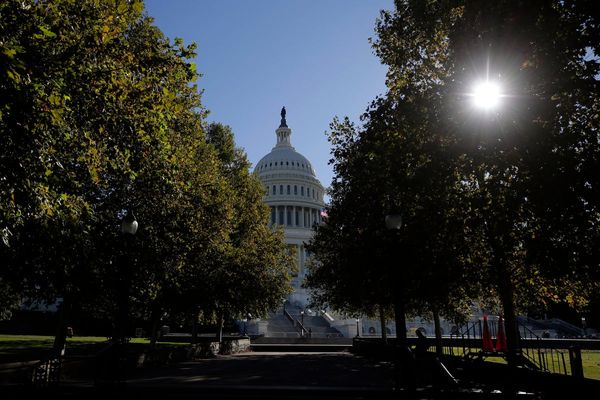
The day after the border between Gaza and Egypt opened, the Abushaabans left the Khan Younis refugee camp and headed for the Rafah crossing.
With the crackle and thump of gunfire and airstrikes in the distance, the two women walked south, praying that their names were on a list of American nationals allowed to enter Egypt and that they would soon be able to go back to their home in Houston, Texas.
Half of those prayers was answered. The elder Abushaaban was on the list, but her 20-year-old daughter was not.
Thinking it was surely a clerical error, they contacted Maria Kari, one of dozens of US-based immigration lawyers who have been lobbying the state department and congressional representatives to help US families trapped in Gaza return home.
But when the Abushaabans reached Rafah, it became clear there was no hope. The elder of the two – who have both asked not to be named – had to make a decision: enter Egypt alone and hope her daughter soon be allowed to follow or return together into the humanitarian crisis that is Gaza and wait until both of their names were on the list.
The younger Abushaaban, a kinesiology student at the University of Houston, speaks no Arabic and had only visited Gaza a handful of times before this trip.
“She’s this 20-year-old girl who went with her mom to this part of the world that she cannot navigate on her own,” Kari said. “How on earth could they be separating families? This is not the Trump administration. We don’t separate families at the border.”
Despite the pain from a foot which had swollen from the many miles she had walked, the elder Abushaaban chose to stay in Gaza with her daughter. And after another 24 hours of frantic calls between Kari, the family and the state department, both mother and daughter were permitted to cross the border the next day.
US officials say they have helped some 800 US citizens leave Gaza, where fighting has raged since Hamas attacked Israel on 7 October, killing at least 1,200 people and taking nearly 240 hostage, and Israel launched its campaign against Gaza in response, killing more than 12,000 people, more than 5,000 of whom are children.

But more than 1,200 people with ties to the US – including citizens, green card-holders and their families – remain trapped in the embattled territory.
And for those without connections to the US or other countries, there is no immediate hope of escape. Joe Biden is facing growing calls to back a ceasefire, but although the US president says he is “heartbroken” by the deaths of “many thousands of civilians, including children”, he has yet to echo the calls for a halt in the violence. A ceasefire would only help Hamas, he argues.
The Abushaabans had left Texas for Gaza in August, excited to catch up with relatives. But what was supposed to be a joyful holiday, became a waking nightmare.
When Israeli military officials issued a sweeping evacuation order for nearly half of Gaza’s 2.3 million people to move south or else risk being killed, the Abushaabans initially sought shelter at the Khan Younis refugee camp.
But as the siege continued, conditions became increasingly grim. Food, water and electricity became scarce and all the while Israel was still bombing Gaza from the land, sea and air.
The Abushaabans’ only connection to the outside world was via WhatsApp – and only when there was limited access to the internet. The communication blackouts in the territory meant they had to decide each day whether to call Kari to discuss their attempts to escape, or dial their family, knowing that any conversation might be their last.
From Texas, Abushaaban’s other daughter Mai, 22, worked tirelessly, contacting the state department and immigration attorneys like Kari, to help bring her mother and sister home. Her efforts were not in vain and on 7 November, she was reunited with her mother and sister.
When she finally saw them again, Mai said she couldn’t believe they were actually in front of her.
“I just kept touching my sister, her hair, her face,” she said. “This is essentially a second chance at life.”
Back in Texas, the two women are still wrestling with the emotional toll of their ordeal and neither felt ready to speak to a reporter about their grueling experience, said Mai. Both are showing signs of survivor’s guilt and have expressed a desire to go back for the people they had to leave behind.
All three women are haunted by the fate of their relatives who remain trapped in Gaza, Mai said.
“My mom and sister are just traumatized from what they had to go through,” she said. “They feel guilty for even having that privilege to be able to leave and to know there’s other people who want to leave and they just can’t, including our loved ones.”
Many others who escaped Gaza are wrestling with the same agony of leaving relatives behind.
Naela Elshorafa, 66, of Camarillo, California, was visiting her ailing 85-year-old mother when the war broke out. She spent 33 traumatic days in the territory before she was finally able to reach Egypt and then travel home to California.
In a Zoom interview, she apologized for her raspy voice, the result of what she believes was Israel’s use of white phosphorus artillery shells.
“Look what happened to me from the chemicals. I am very sick,” Elshorafa said. “Whenever they [were] bombing us, you hear and see the smoke. And you start to smell it. Phosphorus, they said.”

Human Rights Watch has confirmed Israel deployed white phosphorus, which can cause horrific burns and respiratory damage.
Before she crossed the border Elshorafa was sheltering in a house with 50 others. There was only one bathroom. Back home in California, she still feels guilty for being able to brush her teeth and take a shower, she said.
Elshorafa is safe, happy to see her children and play with her baby grandson again. But she too remains overwhelmed with concern for her immediate family members still trapped in the war zone. Many of her siblings and cousins – including her sister Nadia and their 85-year-old mother – remain in Gaza.
Because none are US citizens, their chances to leave Gaza are slim to none.
“I am American. I am [an] American citizen. I have the right to take my mom out,” Elshorafa said. “I try to connect with the media and the government and try to get my family out. This is what I’m looking for. I want my family out. Why can’t I get my family out?”
In April 2022, the Biden administration announced Uniting for Ukraine, a program that allows Ukrainian nationals fleeing Russia’s war against Ukraine to come to the US temporarily, so long as they had a US national family member that could support them.
The Biden administration has not afforded the same option to Palestinians fleeing Israel’s war against Gaza, which greatly frustrates many Palestinian Americans like Elshorafa, especially since her mother was suffering from a lung infection when she left and her medication supply was dwindling.
“Now what comes to my mind is [whether] I get them out or not. Or is it gonna be too late?”







